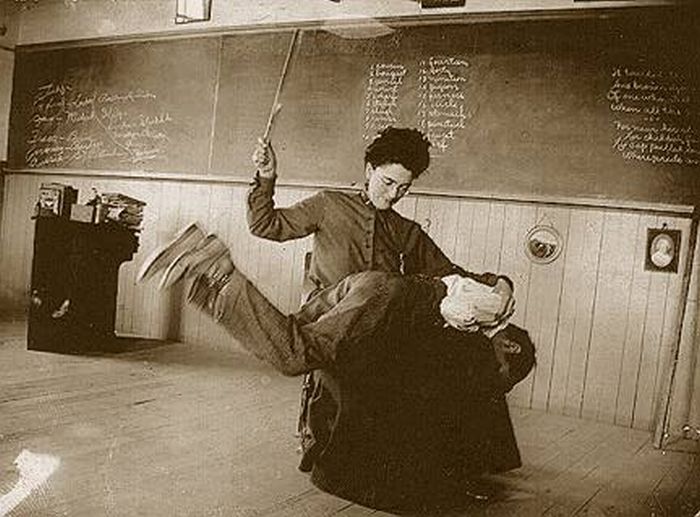Why demand research for computers but not textbooks?
 Thursday, March 5, 2015 at 07:36AM
Thursday, March 5, 2015 at 07:36AM 
Weren't one room schools just a bit of educational heaven? Corporal punishment. Easily intimidated poorly-paid teachers. Terminal educational level of 8th grade. Short terms interrupted by farm labor. Long walks to school, uphill both ways. Oh for the days...
In Evidence for Textbooks? Evidence for Classroom Computers?, Larry Cuban argues why textbooks don't need research to demonstrate their effectiveness, while computers do. In part, he argues that textbooks are just a historical staple of the classroom, and don't demand scrutiny:
Two hundred years ago, the most basic tools for teaching reading, math, writing geography, and history in mostly one-room public schoolhouses with students ranging in age from four to twenty-one were in very short supply. Before children had individual textbooks filled with the knowledge and skills they were expected to learn, the teacher had a book–the Bible, Webster’s Speller, or similar texts–and told students everything that was on the page that they had to learn. Initially before the Civil War, parents had to buy books for their children to attend school before some city schools (e.g., Boston, New York City) began to buy textbooks for all children attending school. From the 19th century until the mid-20th century, textbooks were the computers of the day giving students access to basic knowledge.
Textbooks were computers of the day? Larry, aren't computers the computers of the day today? Might a educational historian, even 20 years from now, write:
In the early 21st century the most basic tool for teaching reading, math, writing, geography, and history in public classrooms with students ranging in ability level from four to twenty-one was in very short supply. Before children had individual computers linked to the knowledge and skills they were expected to learn, the teacher had sets of dull, out-dated textbooks–and told students everything that they had to learn was in them. Initially, parents had to buy computers for their children to attend school before some schools and states began to buy computers for all children attending school. From the 21st century onward, computers were the textbooks of the day giving students access to basic knowledge.
If textbooks don't need effectiveness research, neither do computers. Let's just accept them as a basic modern tool (of at least the affluent) and evaluate not their presence, but their distribution and effective use.








Reader Comments (3)
Hmm. I am wondering how does one measure "effectiveness" of an object like a textbook or computer? Would the measure have something to do with how well they serve as doorstops? How much damage to the spine they cause when students lug them around unnecessarily?
I really hope that "the stuff" isn't what drives purchasing decisions...or even "the text."
From Cuban's article: "Even today when some districts buy licenses to load current textbooks on tablet computers or laptops, it is the text that remains central to most, but surely not all, teachers’ lessons."
I also hope that learning outcomes and student needs might be what helps makes decisions about the range of resources every teacher and student should have access to in order to succeed in mastering the content and skills needed for life beyond the classroom.
Good food for thought.
As both student & teacher, I must say that one room schools were heaven: personalized self-paced instruction with lots of multi-level group problem solving projects. I can remember the "Johnny can't read" problem brought on by publishers who thought that full page pictures behind the text Johnny was supposed to be reading looked nice. Test everything old or new. We should be researching textbooks & ebooks, blackboards & interactive whiteboards. Everything has its place & use but that place & use will change over time.
Hi Colet,
I've argued for a long time that controlled studies showing causation are nearly impossible in education. No one is willing to change just one thing. No one is willing to do long term work. No one is willing to hire the expertise needed to insure statistical validity.
Educational research is sketchy, if not down right fantasy!
Doug
Hi Ron,
I can imagine that one-room schools had their advantages, especially if the class sizes were small. I seriously doubt much "action-based" research was done in them formally. It seems the teacher was somehow able to tell if something worked or not with out it.
Thanks for the commment,
Doug